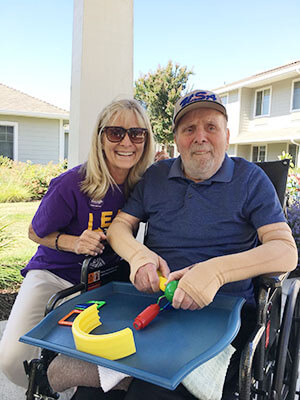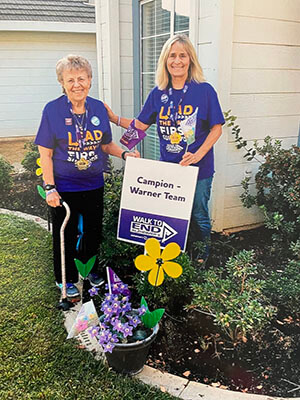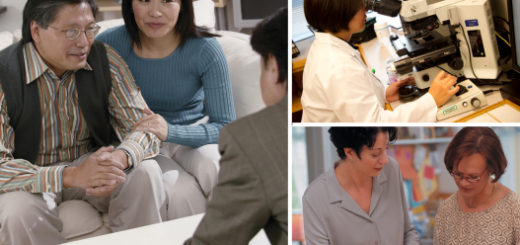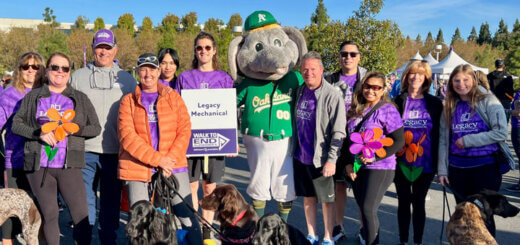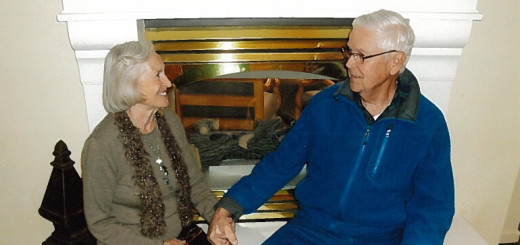Mother daughter duo promote Alzheimer’s awareness in Galt
When Elsie Warner’s husband was diagnosed with dementia, she and her daughter, Denise Campion, felt lost and were deeply concerned about the unknowns that were ahead. With the help of conferences provided by the Alzheimer’s Association®, they were able to take what they learned and successfully apply it. Elsie and Denise are now an unstoppable duo, using their knowledge to help others who may not know about the disease or the support available.
Don before Alzheimer’s
Don Warner is a wonderful husband and father. “Dad was a man of great integrity, kindness and always a gentleman,” said Denise. “He has a great sense of humor, was a good provider and he couldn’t have been a better dad. Even through this disease, he still has that gentle demeanor and twinkle in his eyes. If he hears our voice, he’ll pucker his lips and blow a kiss; it’s heart warming.”
Falling
In 2011 Elsie, Don’s wife, noticed that Don was dragging his feet when he walked. He was also having trouble remembering his friends’ names, or specific words. “He couldn’t think of the word for squirrel,” said Elsie. “He would say, “˜What is the name of the gray critter that carries walnuts in his paws and buries them for food?”
Within a three-month span, Don fell on three separate occasions. “I wasn’t concerned,” said Elsie. “They were all in places where anyone could have fallen. He tripped down a step and also in the garage. The third time, he was fishing with my son, grandson and son-in-law and fell on the cobblestone embankment down to the water. Over the years, I’m sure everyone has stumbled or tripped there.”
However, by the third fall Don became worried and called his doctor. “We went to the doctor and told her about the falls. His doctor referred him to a neurologist,” said Elsie. “While Don was taking a test at the neurologist appointment, I mentioned that he also was having trouble remembering names, bringing up words and balancing the checkbook. The neurologist immediately scheduled another appoint for testing.”
It was during this second round of testing that Don found out he needed immediate neck surgery. All other neurological concerns were put on hold until 2012.
Getting a diagnosis
In 2012, after recovering from neck surgery, Don returned to the neurologist for more testing. He was initially diagnosed with mild cognitive impairment (MCI). MCI is an early stage of loss of memory or other cognitive abilities (such as language or visual/spatial perception) in individuals who maintain the ability to independently perform most activities of daily living.
By 2014 the disease had progressed, and Don was experiencing new symptoms such as not taking his medications, becoming suspicious of people stealing his things or hurting his family and losing the ability to drive safely.
It was at this time that Elsie knew she needed to be closer to family. Elsie said, “Miraculously, God provided a home for sale across the street from Denise and her husband Curt.”
After moving into their new home in 2015, Don’s doctor recommended that he be tested by someone at the UC Davis Alzheimer’s Disease Center. After some testing, Don was given a new diagnosis of Lewy body dementia (LBD). LBD is a type of progressive dementia that leads to a decline in thinking, reasoning and independent function because of abnormal microscopic deposits that damage brain cells over time.
Elsie’s cancer
This same year, Elsie found out she had lymphoma. Elsie was in and out of the hospital six times that year. “It was a hard summer,” said Elsie. “But the treatments did the job, and the cancer went into remission. I was very grateful that we had made the decision to move across the street from Denise and Curt. Denise, Curt and the professional caregivers we hired were all excellent. You name it they did it.”
“It was very hard to have both parents take such broadsiding turns with their health at the same time.” said Denise. “As a family we just pulled together and blended our support systems. We made sure they had the best doctors, and that was a great comfort.”
In 2019 Elsie’s cancer came back. She was able to participate in a clinical trial until the onset of the pandemic in March 2020. “I prayed the cancer would not get worse,” said Elsie. “I’ve been stable since March of 2020. The doctors are amazed.”
Catching COVID
Elsie and Denise tried their best to take care of Don at home. However, it came to a point where they felt he needed a level of care they were no longer able to provide. As a result, Don has been living in a care setting in Stockton since January of 2018. Three months later, Elsie moved into assisted living at the same care setting.
This worked out well for both Elsie and Don until the pandemic started. In July 2020, there was an outbreak of the coronavirus at their care setting. Elsie was forced to make the difficult choice; stay in the care setting near her husband and possibly get COVID or return to her home across the street from Denise.
Because Elsie still has cancer, she decided it was best for her to return to her home. “It was heart wrenching,” shared Denise. “When we could see him, it was through the window, and occasionally on a Facetime call with a staff member. His decline was dramatic, he became significantly withdrawn and without expression.”
In August of 2020, Don tested positive for COVID. Elsie and Denise weren’t sure if Don would survive. They were only allowed to see Don through closed window visits for the next three months. When they were finally able to sit with him on the patio, Don was a different person.
“There was no eye contact,” said Elsie. “He looked down a lot. There was nothing I could do.”
Luckily for Don, it seems his decline in isolation wasn’t permanent. “When we got to see him again, his demeanor became positive,” said Denise. “He started making eye contact and interacted with us. He responded to hands on activities and seemed to take in his surroundings enthusiastically. It was an incredible transformation.”
“With there being an absence of COVID for some time [at the care setting], I was able to move back into assisted living in May of 2021. It has been wonderful spending time with Don almost daily. We are so thankful that family has also been able to visit their dad and grandpa!”
Education conferences
Initially, Elsie learned about the Alzheimer’s Association 20 years ago when she learned that her neighbor was living with the disease. “We wanted to be friends and say the respectful thing,” said Elsie. “I’m so thankful for the Alzheimer’s Association. They told me about the book the 36-Hour Day and gave me helpful information.”
10 years later, when Don was diagnosed, Elsie learned about an education conference the Alzheimer’s Association puts on every year. “It was a very informative, eye-opening conference providing a wealth of information,” said Denise. “It not only helped our family, but also helped me in my profession as a dental hygienist, providing care for our patients who were living with Alzheimer’s or dementia. In addition, I was able to share a lot of material and resources with my colleagues, friends and others who were in need of support.”
Starting a Walk team
After Don moved into the care setting, Elsie and Denise were introduced to the Stockton Walk to End Alzheimer’s. They joined the care setting’s team and walked with them that year.
In 2019, Elsie and Denise decided they wanted to start their own family team. This is their third year as co-captains. Since Don can’t join them on Walk day, they visit him after the Walk and bring pizza for anyone who participated that day. Denise said, “Dad may not be able to join us for the Walk, but we walk in his honor and he is very much a part of our celebration.”
Sadly, just before the posting of this blog, Don died. Elise, Denise and the rest of their Walk team will honor Don by continuing to support Walk to End Alzheimer’s. This year they will transition from carrying the yellow Promise Garden Flower to the purple flower.
The colors of the Promise Garden Flowers represent participants’ connection to Alzheimer’s. Yellow signifies a person who is currently supporting or caring for someone living with Alzheimer’s. Where purple signifies an individual who has lost someone to the disease.
Increasing awareness
Elsie had seen the Alzheimer’s Disease Facts and Figures Report at the education classes she had attended. It wasn’t until she signed up for Walk that it finally hit home. “Reading that one in three seniors will die from dementia,” said Elsie. “I quickly calculated that meant there was a possibility that six of my immediate family members could be going through this when they became seniors.
“I couldn’t bear the thought of one of my children or grandchildren going through this journey again. I will do all I can to help bring about that first survivor!”
Since then, Elsie and Denise have made it their mission to spread awareness both about the disease and about the Alzheimer’s Association.
“We need more education and understanding in the [medical] field,” said Elsie. “Two years ago, I wrote a letter to a couple of doctors I went to. We sent them a packet, and they were so appreciative and talked to everyone at the hospital. They personally thanked me.
“I will forever be grateful to the Alzheimer’s Association for giving me the knowledge and understanding of the disease, as well as caregiving suggestions and guidelines. We want to help share this same opportunity to those just starting to walk down this journey.”
“I never understood how heart wrenching Alzheimer’s and dementia were until dad’s diagnosis,” Denise shared. “As a family navigating through this journey together, we have seen how it strips memories, deteriorates the body and breaks the hearts of loved ones. It means the world to us if we can help lighten the load for anyone who has a loved one living with the disease. The weight is heavy but hope and support are available.”
Information packets
Recently, Elsie and Denise have been putting together packets of resources for their local churches. It includes information on the disease, how to contact the 24/7 Helpline (800.272.3900), upcoming education classes and support groups, and the book, The 36-Hour Day.
“We are very passionate about helping to create more community awareness of the support that is available,” said Denise. “We are excited to have reached out to churches this year. We’ve added resources to their libraries and shared information with staff and parishioners. We could never have got through this journey alone and will forever be grateful for the guidance others have shared with us.”
Courtesy cards
When Elsie and Denise used to take Don out to restaurants, they would keep a courtesy card in their wallets. These cards are the same size as a business card and note that their companion has dementia. They used to show the cards to staff at local businesses, to ask for their patience and support.
“We’d hand them a card and they would treat us totally differently,” said Elsie. “Their body language would change, along with how they spoke with us. it was an immediate transition to empathetically understanding.”
You can’t do it alone
Elsie and Denise both agree that you can’t take this journey alone. Support from family, friends and the Alzheimer’s Association can help get you through it.
“Call the 24/7 helpline (800.272.3900),” said Elsie. “It seems like they can help you no matter what, whether it be finances, legal affairs, or even help you find a doctor.”
“Try to find a medical team you’re confident in,” said Denise. “Reach out for support. There is no such thing as a bad question. Take care of yourself as a caregiver! Treat your loved one with kindness, love, patience, and respect. Never underestimate what they may be able to feel or understand.”
Feeling grateful
Despite the challenges her family has faced, Elsie has a lot of gratitude. “I am grateful that we have a very close family, and that we are, and always have been, on the same page,” said Elsie. “I am also especially thankful that we have lived across the street from our daughter Denise and Curt, for the last six years! They have constantly been with me at my side. I can’t imagine traveling down this journey alone.
“I am also grateful for the love of our sons and their families, and the constant contact we have with each other, even though they are out of state. I will also FOREVER be grateful to our “˜Alzheimer’s Family!’ There is nothing this family can’t get through together. We just take it one day at a time.”
You can join Elsie and Denise’s team, Campion-Warner Team, or form your own team and join us for the Stockton Walk to End Alzheimer’s on October 16 at Swenson Park Golf Course in Stockton. Not in Stockton? Find a Walk near you at alz.org/walk.
Learn more:






